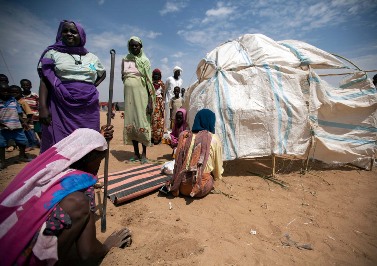Darfur violence signals return to “dark days”: HRW
March 23, 2014 (KHARTOUM) – The Sudanese government and its allied militia have renewed ground and air attacks on civilians in villages in Darfur as the security situation in the troubled western region continues to unravel.

According to Human Rights watch, the Sudanese army (SAF) and rapid support forces (RSF) – also known as the Janjaweed militia – launched separate attacks on 45 ethnic Fur and Zaghawa villages in South Darfur in late February and early March.
Community leaders from the Hijier and Um Gunia villages provided HRW with a list of 38 civilians who were killed in the attacks, and the names of 10 others who remain unaccounted for. HRW heard that many of the dead bodies were left unburied as people fled.
The New York-based advocacy group says clashes between government and rebel forces in Darfur have also increased significantly in recent weeks, describing the escalating violence in the region as “a return to the dark days of the past”.
The latest attacks came after rebel forces earlier fled the area, and appear to have deliberately targeted civilians.
Eyewitnesses told HRW that government aircrafts bombed the area, followed by ground attacks by forces travelling in land cruisers and on horses and camels.
The RSF have since moved toward eastern Jebel Mara and to North Darfur, attacking villages in both locations, said HRW, citing local media reports.
UNAMID said that as a result of the latest incident on Saturday, at least 2,000 IDPs had sought refuge at its base in Khor Abeche, where one person was reportedly killed.
The mission has also deployed additional peacekeepers after an estimated 1,000 people gathered at its Korma base in North Darfur after Kobe town and neighbouring villages were attacked by armed men on Friday.
It says it is working closely with humanitarian partners to provide emergency assistance to those in need.
The fresh wave of violence has uprooted about 50,000 people in South Darfur alone, while clashes between militias, including a rebel force led by Musa Hilal, who recently defected from the government, have displaced a further 65,000 people in North Darfur, according to UN estimates.
NO END IN SIGHT
A recent report by Amnesty International found that serious violations of international humanitarian and human rights law continue to be committed against the civilian population on an almost daily basis, describing the situation on the ground as “dismal”.
It says there appears “no end in sight” to the ongoing cycle of violence plaguing the war-torn region.
The report, titled We can’t endure anymore: The impact of inter-communal violence on civilians in Central Darfur, documents cases of looting, rape and murder which it says have occurred against a backdrop of protracted inter-communal violence, clashes between government and rebel groups and attacks on civilians by armed militias.
“Darfur’s culture of traditional justice, the lack of accountability for human rights and IHL (International Humanitarian Law) violations has contributed to the ongoing violence and the pervasive culture of impunity in the region,” the report said.
“Impunity extends to the highest level of government and militia leaders. Victims have no hope at the moment of accessing justice, truth or reparations nationally,” it adds.
INTER-COMMUNAL VIOLENCE
Competition over land and resources has added another dimension to the 11-year conflict, leading to an upsurge in inter-clan fighting between different Arab tribes in North, Central and South Darfur, according to a recent report released by Amnesty International.
The report found that tribal conflict was directly linked to Sudan’s declining economic situation.
The UN refugee agency (UNHCR) estimates that 460,000 people were internally displaced last year alone due to inter-communal violence – the highest number since the height of the conflict in 2004.
Meanwhile, South Darfur state governor, Adam Mahmoud Jar Al-Nabi, has defended the deployment of the RSF and denied troops were responsible for committing abuses, saying units are well-trained and disciplined.
The feared Janjaweed militias were initially mobilised by the Sudanese government to quell the insurgency that broke out in Sudan’s in 2003 and has since displaced more than 2 million people.
(ST)
